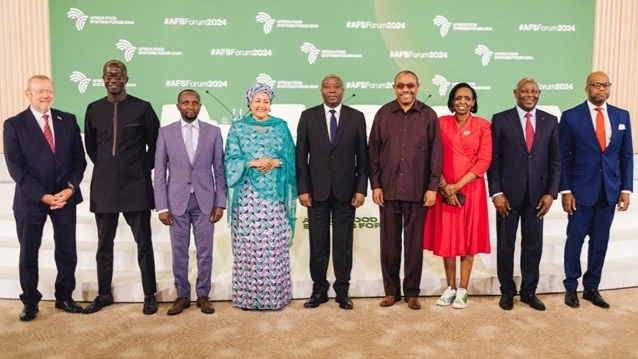
By Edson Baraukwa | Africa Guardian
Rwandan President Paul Kagame has praised the Alliance for a Green Revolution in Africa (AGRA) for ensuring that Africa has a clear voice in the future of its food systems. Speaking at the recently concluded Africa Food Systems Forum 2024, Kagame highlighted the critical role of food production in Africa’s economy, noting that most of the continent’s population is engaged in agriculture and agribusiness.
“Food production is the foundation of our economies, and indeed of life itself. Significant progress has been made in recent years to make our food systems more resilient and productive, but there is still room for growth to increase productivity and enhance farmers’ wealth,” Kagame told the gathering.
He emphasized that increased agricultural productivity leads to lower food prices, which directly impacts poverty and inflation. Kagame also underscored the importance of digital and technological applications in agriculture and the need to attract more private investment to the sector.
The Africa Food Systems Forum, hosted in Kigali, Rwanda, brought together over 5,000 delegates, including 38 smallholder farmer groups, representatives from 97 countries, 302 speakers, 882 youth, 7 former heads of state, 37 ministers, and 149 members of the press. The four-day event culminated in significant commitments, partnerships, and investments aimed at transforming Africa’s food systems. The forum’s goal is to drive inclusive agricultural transformation across Africa, increasing incomes and improving food security for 30 million smallholder households.
Key discussions focused on shifting agriculture from a social sector to a commercial one and designing policies tailored for Generation Z. Delegates emphasized the need to move away from outdated Western policy models and instead develop policies based on the realities and responses of local populations, including Gen Z and Indigenous communities.
AGRA Board Chair Hailemariam Dessalegn highlighted the need for collaboration across governments, the private sector, civil society, and international partners to achieve the scale of change required. “No single entity can achieve this transformation alone. We must work together in a spirit of true partnership and collaboration,” he said.
He further stressed that Africa’s food systems have not received the political commitment and investment they deserve, urging for collective efforts to ensure access to healthy, nutritious food for all and to engage African youth in developing innovation ecosystems in food systems.
Established in 2006, AGRA is an African-led organization focused on positioning smallholder farmers at the core of Africa’s economic growth. In partnership with various stakeholders, AGRA aims to transform agriculture into a thriving business, enhancing food security and increasing incomes in 11 African countries.
The forum also featured a critical roundtable on the African Fertilizer and Soil Health Action Plan (AFSH-AP) and the Soil Initiative for Africa (SIA), co-hosted by AGRA and the Coalition of Implementers for Fertiliser and Soil Health (CIFSH). The discussions shed light on the challenges and opportunities in securing Africa’s agricultural future. AGRA President Dr. Agnes Kalibata emphasized the significance of the African Agricultural Status Report, calling it one of the most influential documents in the sector.
Dr. Kalibata highlighted examples such as Tanzania’s legacy program, which has laid a strong foundation for food systems, and Sierra Leone’s potential to become a leader in food security. She called for more regional collaboration, citing Rwanda’s success in sourcing seeds from Zambia.
The forum also launched the Centre for African Leaders in Agriculture Cohort 4, an initiative aimed at increasing leadership within the agricultural sector and fostering the next generation of agricultural leaders. Dr. Kalibata expressed pride in the initiative’s achievements and thanked the African Management Institute (AMI) for their support.
Delegates had the opportunity to engage directly with youth leaders, discussing ways to support young people in finding jobs and building careers in food systems. Wamkele Mene, CEO of the African Continental Free Trade Area (AfCFTA), highlighted the need to reduce intra-African trade barriers, particularly for agricultural products, to unlock new markets and address food insecurity.
James Mwangi, CEO of Equity Group Holdings, called for urgent action to tackle climate change, describing it as the “pandemic of agriculture” for smallholder farmers. Lord Collins, UK Minister for Africa, reaffirmed the UK’s commitment to economic partnerships with Africa and praised the innovation and entrepreneurship displayed at the forum.
Media professionals from across the continent also discussed the role of the media in amplifying the African food systems narrative through mainstream and online platforms.
Affiong Williams, CEO of ReelFruit, won the Women Agri-Preneur of the Year Award (WAYA) for her outstanding contributions to agribusiness. The award, which included a $40,000 cash prize, celebrated her efforts in demonstrating how enterprise can transform lives and the sector. This year’s WAYA awards saw a record 1,535 applications from 44 African nations, underscoring the growing influence of women in Africa’s agribusiness sector.
___
